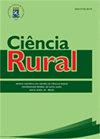Growth and light environment of fruit trees in silvipastoral systems for rearing of dairy herds
IF 0.9
4区 农林科学
Q3 AGRONOMY
引用次数: 0
Abstract
ABSTRACT: Silvopastoral systems can have animal welfare and sustainability benefits because trees continually remove carbon from atmosphere, reducing greenhouse effects. Thisstudy identified the most promising fruit trees for inclusion in silvopastoral systems to dairy cattle calves. This experiment was conducted at EmbrapaAgrossilvipastoril, Brazil, between 2014 and 2018. Five silvopastoral systems with fruit trees and ‘Tifton-85’ grass were designed to evaluate tree growth and light environment under the canopies. Data were analyzed using SAS® and PDIFF (P < 0.10). Caja fruit trees had the greatest tree height (5.4 m) and trunk diameter (23.4 cm), while acerola fruit tree had the smallest (1.8 m and 8.3 cm, respectively). At 42 months (drought 2017), caja, cashew, and guava trees had similar heights. Guava trees had the highest light interception (89.3%), both cashew cultivars provided medium levels of shade (50 to 60% LI) and with greater constancy between the rainy and dry seasons. The systems that showed increased light interception during the drought period were those with CCP76 in 2017 and EMB51 in 2018. Higher incidences of wavelengths of the spectral composition of light occurred between the rainfall (2015) and drought (2017) periods, and greater differences in the ratio of red:far red in 2015. By 2018, there were no more differences between the rainy and dry seasons for the spectral composition of light under the tree canopies. Cashews and guava trees have adequate growth and light environment to support silvopastoral systems but Caja and acerola fruit trees showed limitations.林牧系统中果树生长和光环境的研究
摘要:森林生态系统具有动物福利和可持续发展效益,因为树木不断地从大气中吸收碳,减少温室效应。本研究确定了最有前途的果树纳入到奶牛犊牛的银寄生系统中。该实验于2014年至2018年在巴西的EmbrapaAgrossilvipastoril进行。设计了5个有果树和“蒂夫顿-85”草的银栖系统,以评估树冠下树木的生长和光环境。采用SAS®和PDIFF分析数据(P < 0.10)。树高最高的是Caja果树(5.4 m),树干直径23.4 cm,最小的是针叶果树(1.8 m),树干直径8.3 cm。在第42个月(2017年干旱),caja,腰果和番石榴树的高度相似。番石榴树截光率最高(89.3%),两种腰果品种提供中等水平的遮荫(50%至60% LI),雨季和旱季之间具有更大的稳定性。在干旱期间,光拦截增加的系统是2017年的CCP76和2018年的EMB51。在降雨(2015年)和干旱(2017年)期间,光的光谱组成波长的发生率更高,2015年红远红比的差异更大。到2018年,树冠下光光谱组成在雨季和旱季之间不再存在差异。腰果和番石榴有足够的生长和光照环境来支持森林系统,但Caja和针叶果树存在局限性。
本文章由计算机程序翻译,如有差异,请以英文原文为准。
求助全文
约1分钟内获得全文
求助全文
来源期刊

Ciencia Rural
AGRONOMY-
CiteScore
1.70
自引率
0.00%
发文量
233
审稿时长
2-4 weeks
期刊介绍:
The purpose of Ciência Rural is to publish the results of original research, note and reviews which contribute significantly to knowledge in Agricultural Sciences. Preference will be given to original articles that develop news concepts or experimental approaches and are not merely repositories of scientific data. The decison of acceptance for publication lies with the Editors and is based on the recommendations of Editorial Comission, Area Committee and/ or ad hoc reviewers. The editors and reviewers are external to the institution.
 求助内容:
求助内容: 应助结果提醒方式:
应助结果提醒方式:


